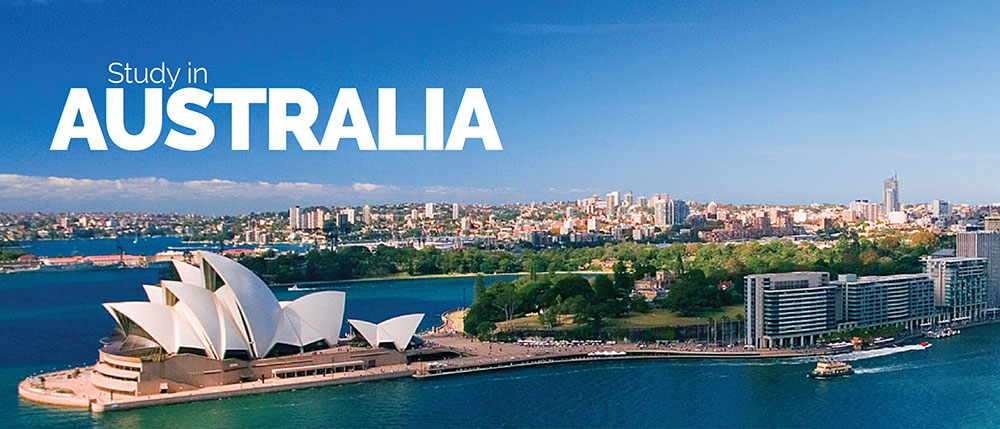
For Consultation
+91 9363616166 (TN) +91 7904404004 (KL)
Countries List
Online Registration
Study in Australia
Australia beckons international students with a world-class education system, stunning landscapes, and a vibrant multicultural society. Earning a degree here offers academic excellence, career advantages, and an unforgettable life experience.
- Top-Tier Education
Australian universities consistently rank among the best globally, boasting cutting-edge research and innovative teaching methods. You’ll gain valuable skills and knowledge from esteemed professors in a supportive learning environment.
- Diverse Coursework
Australia offers a vast array of programs across various disciplines. Whether you’re passionate about engineering, business, marine biology, or creative arts, you’ll find a program that aligns with your goals. Consider popular fields like
- Practical Advantages
Australian degrees are recognized internationally, giving you a competitive edge in the global job market. Many universities offer internship opportunities to gain practical experience alongside your studies. The Temporary Graduate visa allows you to work in Australia after graduation, giving you a head start on your career.
- Unforgettable Lifestyle
Australia boasts a breathtaking coastline, diverse ecosystems, and bustling cities. From exploring the iconic Sydney Opera House to diving the Great Barrier Reef, you’ll have countless adventures outside the classroom. The multicultural environment allows you to connect with people from all over the world, fostering lifelong friendships and a global perspective.
Test Requirements For Australia
Australia has designated English as its national language. A student must possess a requisite degree of linguistic competency in order to pursue studies at that institution. This must be demonstrated/validated to both the university authorities and the visa office.
To enhance your English proficiency, the most effective approach is to take the International English Language Testing System (IELTS) examination. Many university websites provide the minimum IELTS score required for the specific course that the student desires to study.
Additional Examinations: Advanced education in specialised or vocational fields, such as teacher education or teaching assistant programmes, may necessitate subject-specific assessments.
This section contains details regarding the English language competency prerequisites as well as information about the International English Language Testing System (IELTS) and the Graduate Management Admission Test (GMAT).

Australian Visa
You must submit an application for a student visa. In order to obtain a student visa, you must fulfil the following steps: fill out a visa application form, submit it along with the necessary supporting documents, pay the requisite application fee, and meet the criteria set for student visas. In order to obtain a student visa, you must have the intention to study a course that is registered and commit to studying on a full-time basis. Additionally, you must comply with other visa restrictions once you have arrived in Australia. This section provides details about Visa prerequisites and protocols.
Universities In Australia
The student community in Australia comprises approximately 500,000 international students from more than 150 countries who are enrolled in universities.
The universities in Australia collaborate with the government to guarantee that the quality of teaching and courses at the 39 Australian universities remains at an exceptional global standard.
In Australia, the terms “University” and “Degree” are legally protected, ensuring that only institutions that meet rigorous quality assurance standards can use these names.
All 39 government-funded institutions are included in the Australian Qualifications Framework. Additionally, there are private educational establishments that provide higher education. Many of these institutions are considered ‘accredited’, meaning they have been officially allowed by the government of a state or territory to develop and offer higher degrees that meet the necessary standards. Australian universities offer abroad branch campuses, twinning partnerships, and exchange programmes for students and staff worldwide.
Higher or post-secondary education can be classified into two categories: The first category consists of universities or other institutions of higher education. The second sector is the Vocational Education and Training sector, which offers courses that focus on practical skills and are highly appreciated or demanded by the industry.
The Australian education system undergoes regular evaluations by the government, industry, and professional organisations to ensure that it remains dynamic and responsive to the evolving economy and its emerging needs.
The Australian Universities Quality Agency (AUQA) is an autonomous, non-profit national entity that advocates, examines, and publishes findings on quality control in Australian higher education.
The Australian Qualifications Framework (AQF) is a comprehensive and standardised system that encompasses all national qualifications in schools, vocational education, and training.
Several institutions are currently collaborating with their counterparts abroad to either provide the courses of the international partners in Australia or vice versa. This novel worldwide strategy ensures that students remain connected to the global community.
Our Services
- Student Counselling
- Course Suggestions
- Scholarship
- Loan Process
- SOP Preparation
- Abroad Accommodation

Branches
Tamil Nadu, India | +91 9363616166
Kerala, India | +91 7904404004
London, United Kingdom | +44 7423021402